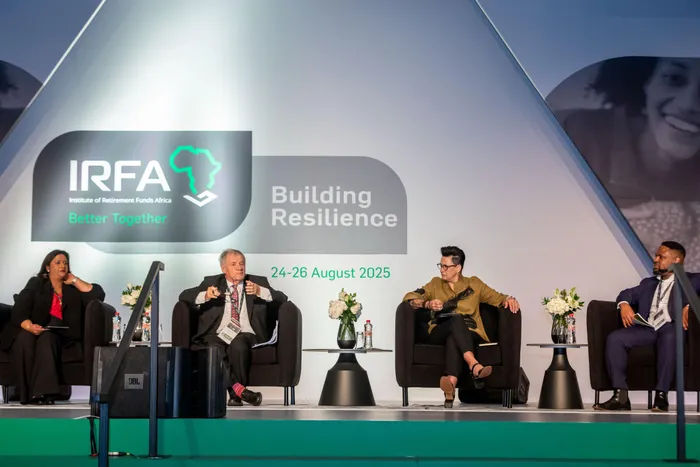Africa's retirement fund industry at a crossroads to drive economic transformation
PENSION FUNDS

From left to right: Nancy Andrews, an executive member of IRFA; Judge Dennis Davis; IRFA President Geraldine Fowler, and Brian Karidza from the GEPF speaking at the the Institute of Retirement Funds Africa (IRFA) 2025 annual conference in Cape Town.
Image: Supplied
Industry leaders participating at the Institute of Retirement Funds Africa (IRFA) 2025 annual conference have said that Africa's retirement fund industry, which manages trillions of rand in collective assets, is on the brink of a transformative juncture.
Central to this transformation is the urgent need to build member trust—a critical component that could unlock unprecedented economic growth across the continent.
During a judicial-style panel discussion at the conference which ends on Tuesday, pension fund leaders grappled with the pressing issues surrounding strategic asset allocation and its potential to address Africa's notorious infrastructure deficit while also ensuring strong long-term returns for retirees.
The theme of the conference, articulated by IRFA President Geraldine Fowler, proclaimed that retirement funds have shifted from mere custodians of savings to becoming catalysers of social and economic transformation.
"Trust is the currency of our time. We are no longer just custodians of savings - we are catalysts of stability, architects of trust, and drivers of social and economic transformation," Fowler said.
Fowler outlined the "African paradox" stating that by 2050, Africa will be home to one in four people globally, becoming the world's youngest continent, yet it currently boasts the lowest retirement savings coverage anywhere.
She said this striking demographic reality presents retirement fund leaders with unique opportunities, yet it also underscores an urgent challenge—how to secure member support for transformative investments.
Judge Dennis Davis, who moderated the panel discussion, pursued incisive inquiries about how pension funds balance fiduciary responsibility with societal impact. The responses underscored a critical shift—responsible asset allocation is not merely an act of philanthropy; it is sound economics.
According to Brian Karidza of the Government Employees Pension Fund (GEPF), the foundation of member trust is rooted in operational resilience.
"Members want to know one thing: will you pay me when payment is due, to the right person, on time, and under any circumstances? When we deliver on this promise consistently, we earn the right to their trust in our investment decisions," Karidza said.
The Ghana Infrastructure Investment Fund was showcased as a compelling example of how retirement savings can be actively directed towards infrastructure development, balancing financial returns with significant national development benefits.
Nancy Andrews, an executive member of IRFA and head of legal at Discovery EB and Invest, pointed out the collaborative regulatory environment in South Africa as a nurturing ground for such innovations.
"South Africa's policy development framework gives our industry the opportunity to be part and parcel of reforms. Our regulators want to hear what we know about reform and how we want to take it forward," she said.
The conference identified three key pillars essential for fostering the trust required to support transformative asset allocation:
- Operational Excellence: This forms the bedrock of trust, necessitating flawless execution of basic services prior to seeking member buy-in for innovative investments. Recent challenges arising from the two-pot system implementation highlighted the need for enhanced capacity to maintain member confidence.
- Impact Investment Strategy: Leveraging environmental, social, and governance (ESG) principles ensures that growth is sustainable, ethical, and financially sound. Evidence supports the notion that entities embracing sustainability are likely to outperform in the long run, providing additional rationale for member support.
- Regulatory Collaboration: Policy frameworks should empower, not impede, innovative asset allocation while safeguarding member interests. The effective collaboration noted between the industry and regulators demonstrates how implementable legislation can be developed.
Fowler’s candid reflection on the industry’s progress indicated that while strides have been made, there is still room for improvement.
"We need to separate what we have from what we need. Clean our house, and then deal with new challenges," she said.
The conference concluded with a clarion call for pension fund leaders: to earn their social licence to operate as agents of transformation, they must first exhibit operational excellence and maintain transparent communication.
Achieving this will be crucial for securing member trust and empowering Africa's pension assets as catalysts for continental advancement.
BUSINESS REPORT